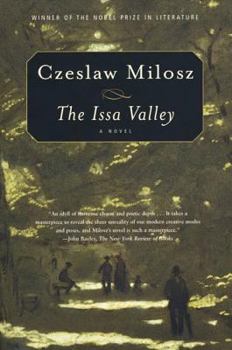The Issa Valley
Select Format
Select Condition 
Book Overview
Thomas, the child-protagonist of The Issa Valley , is subject to both the contradictions of nature in this severe northern setting and sometimes enchanting, sometimes brutal timbre of village life. There are the deep pine and spruce forests, the grouse and the deer, and the hunter's gun. There is Magdalena, the beautiful mistress of the village priest, whose suicide unleashes her ghost to haunt the parish. There are also the loving grandparents with whom Thomas lives, who provide a balance of the not-quite-Dostoevskian devils that visit the villagers. In the end, Thomas is severed from his childhood and the Issa River, and leaves prepared for adventures beyond his valley. Poetic and richly imagined, The Issa Valley is a masterful work of fiction from one of our greatest living poets.
Format:Paperback
Language:English
ISBN:0374516952
ISBN13:9780374516956
Release Date:May 2000
Publisher:Farrar, Strauss & Giroux-3pl
Length:304 Pages
Weight:0.79 lbs.
Dimensions:0.8" x 5.4" x 8.4"
Customer Reviews
3 ratings
What is Man?
Published by Thriftbooks.com User , 16 years ago
Yes to the above. A classic coming-of-age story that, as do the great ones, asks the question, What does it mean to be a man? (Think of Gilgamesh or Huck Finn or precious young Werther.) A question mediated here between two European aristocratic types: There is the guy-man, Pan Romauld, who triumphs with the ladies and as a hunter/killer of birds (so very much the European aristocrat). And there is the whole man, Grandfather Surkont, who does not hunt and is generous to those in his charge--and he has a library!! As well, there are the abundant (perhaps too much so), brilliant, luxurious, and precise descriptions of the natural world of northern Lithuania. In this he joins several East European writers, not only his compatriot Henry Sienkiewicz, but also Paustovsky and (alas!) Gregor Rezzori, this latter with his descriptions of the natural glories of the Bukovinian Carpathians. A fine work of autobiographical fiction in a grand tradtion.
A masterpiece of the inner life..
Published by Thriftbooks.com User , 18 years ago
Winner of the Nobel Prize in Literature,Czeslaw Milosz here writes deftly yet with the right amount of passion about the child,Thomas. What an inner life,what thoughts,what dreams,this child has. He soars with Aurora.then blends with the trees in his beloved Issa Valley. What poetry in writing.. I was enchanted as you will be,too.Let Mr. Milosz and the Issa Valley wrap you in it's gentle and mercurial embrace. M.Baker
Nature under the microscope!
Published by Thriftbooks.com User , 20 years ago
Renowned Polish-Lithuanian poet, Czeslaw Milosz crafts his poetry with prose-like clarity and his prose with flowing rhythm and sententious weight. His coming of age novel, 'The Issa Valley' is a stunning example of how the mediatative lyric can be woven into a novel. The novel takes place in the wild forests of central Lithuania near to where Milosz spent his youthful summers at the manor houses of his grandparents. The central character, Thomas, an adolescent school-boy of an aristocratic Polish family is sent away to his grandparents for the summer. Grandfather Surkont is the model of noblisse oblige, a Polonized Lithuanian aristocrat who strives to keep his household and his villagers happy despite the violent changes which threaten to engulf this forgotten paradise. The time is just after the Great War, when the newly-formed Republic of Lithuania is struggling with its indepedence after centuries of foreign domination, by the Russians on a state level, by the Polish landowners on the local level. Polish 'pan,' Thomas, is abruptly thrown into a fresh and vibrant world completely foreign from the fast-paced city life he has known until now. Here in the villages and manors around the Issa River, the world is pagan and Lithuanian. Ancient spirits and gods dwell in the minds and souls of the Lithuanian peasants who people Thomas's new world. And most of all, Thomas meets up with his newest passion, that which teaches him more than any school-book ever could, the rich and primeval natural world. More than anything, Milosz's novel is a giant mediatative prose poem on the shape and workings of nature. Sentence after sentence drips with near religious reverence for the water-lillied, cobalt-colored Issa, for the inpenetrable jungles of black pine, home to the bullet-headed snipe, siena-shaded mule deer, the fearsome black-bodied, red-hooded forest vipers whose lethal injection will put the strongest of men down before he can whisper, 'Holy Jesus, home to an infinite variety of bird and bug. Thomas is immediately captured by such an environment and sets out to become a 'naturalist.' In the Issa valley that means 'hunter.' Thomas soons attaches himself to the local hunter, Romauld, who initiates Thomas in the arts of tracking, waiting and dropping prey. Thomas hungers to learn this ancient art but fails dismally. Always a step behind, a little too hestitant to pull the trigger, he fails to make the big kill. Until the squirrel. Thomas' deliberate wounding of his unsuspecting and innocent victim causes a painful enlightenment. Through his tears of remorse and agonizing pang of guilt, Thomas grows up in a moment. He has taken life, thereby losing his Adam-like innocence. This two-page metaphor for the fall of man is in itself worth the whole book. This seminal climax in Thomas' life underscores Milosz's central theme: we are all inextricably attached to our environment, slaves of the brutal and beautiful outside world that holds us





